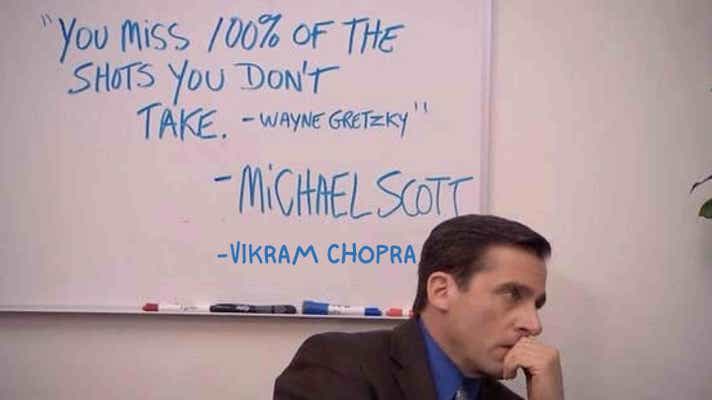

Embracing Discomfort for Growth
Growth often comes from stepping out of our comfort zones and trying new things. It's always uncomfortable at first (and it continues to be uncomfortable forever should you choose to keep raising the bar), but that’s where the magic happens.
I’d never really done any physical activity before, so when I decided to join a gym, it was intimidating. The new environment, the exercises, and the physical effort were overwhelming. For months, I found every excuse to avoid going. Each session felt tough, and I experienced all kinds of negative emotions. But deep down, I knew that this discomfort was part of the process. It meant I was challenging myself in ways I never had before.
Public speaking was another major discomfort. The first time I was on stage in college as the Head of the college festival, I didn’t utter a word and let my co-head do all the talking. The fear and anxiety were overwhelming, but I went on that stage again and again. Even today, there is discomfort, but I am up for it. I am learning in the process. It’s painful but a sweet pain.
Am I great at any of these things? No. But I am better than before. I can see and feel the progress every 12 months relative to my baseline, and that motivates me to go harder and strive for more difficult goals.
At CARS24, we’ve made small and big changes to our business model and continue to do so. These changes often bring uncertainty and discomfort, but they are necessary for growth and innovation. One of the key issues we face at CARS24 is resistance to change. Often, it is coming from the fear of stepping into the unknown. Notice yourself when the conversation turns to higher targets, dramatic changes in approach, trying new ideas, reducing layers in the organization, and challenging the status quo. How many times did you go out of your way for customers? When did you fix a process or take an initiative that no one asked you to? How many times have you argued for something because it is right and not just because your boss said so?
How often do you proactively ask for feedback—not just from your boss but from other colleagues as well? Are you okay with publicly admitting when you’re wrong and appreciating that it’s okay to fail, whether it’s you or others? If yes, you’re learning to embrace discomfort. This mindset fosters continuous learning and growth.
And let me say it again—it’s not easy, but it is not supposed to be easy. Many ask me what’s my motivation to work. My motivation to work is that I know there are a thousand things that CARS24 can do better and a million things I can do better. I can stop now and not take the pain. But the joy is in this sweet pain. The challenge is fun. The obstacles are what I look forward to.
It’s not easy. Many days end in frustration and hopelessness, but more mornings than not, I wake up with renewed optimism. The last two years at CARS24, I have worked harder than in the previous six years. They have been tougher and more challenging, but I am up for it. The tougher it gets, the more it hurts, but I am more motivated than before. The challenges and setbacks don’t disappear, but I’ve learned to view them as opportunities for growth and improvement.
But here’s the thing: if you stick with it, the pain turns into adventure, and the suffering transforms into adrenaline. The pain doesn’t just disappear, and the struggle continues, but it becomes a good kind of pain—a suffering you’re willing to endure. It’s something to look forward to, knowing that even if you fall short, there’s always hope that tomorrow will be better.
When you put yourself in a tougher situation, you're essentially betting on your own capabilities. It's like saying to yourself, "I trust you to figure this out." This act of self-trust can be incredibly powerful. Our brains are remarkable problem-solving machines, and when we commit to a challenge, they often come up with surprising and innovative ways to overcome it.
Most people get stuck in a binary mindset of either "Yes, I can do it" or "No, I can't." This black-and-white thinking can be limiting. The real magic happens when you find yourself in a position where you have to do something. Suddenly, your brain kicks into high gear, devising strategies and solutions you might never have considered before.
For example, imagine you've committed to running a marathon, even though you're not a seasoned runner. At first, it feels overwhelming, and doubt creeps in. But as the marathon date approaches, you start to see progress. You research training plans, find running buddies, and learn about nutrition and recovery. Your initial leap of faith forces your brain to adapt, grow, and find ways to make it happen. Before you know it, you're crossing the finish line, amazed at what you've accomplished.
By trusting yourself and diving into discomfort, you switch on a part of your brain that loves solving problems. This is where real growth happens. You move past the simple "I can" or "I can't" thinking and enter a zone where your creativity and resilience really shine. It's in these moments that you discover just how capable you truly are. In fact, according to a study by the University of California, stepping out of our comfort zones activates the brain's reward system, leading to increased motivation and resilience. This scientific perspective reinforces the idea that discomfort is an essential part of growth.
So, discomfort isn’t as bad as it is made out to be. It’s actually beneficial to have about 20-30% discomfort in life. That’s how you know you’re growing. If you’re not uncomfortable, you’re not pushing yourself.
Next time you’re in a tough spot, remember that discomfort means you’re growing. Embrace it, push through it, and you’ll come out stronger on the other side.



















